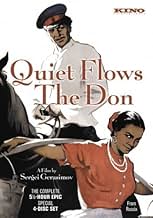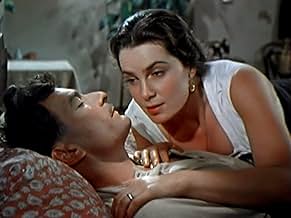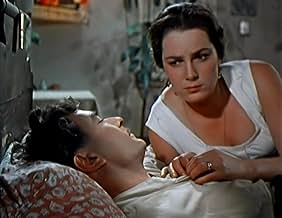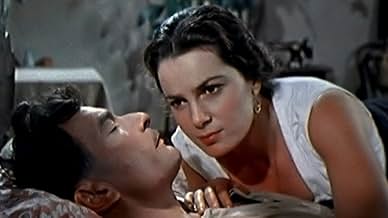NOTE IMDb
7,7/10
1,4 k
MA NOTE
Ajouter une intrigue dans votre langueAn epic story of shattered lives of the Don Cossacks through chaos of World War I, the Russian Revolution, and the following Civil War.An epic story of shattered lives of the Don Cossacks through chaos of World War I, the Russian Revolution, and the following Civil War.An epic story of shattered lives of the Don Cossacks through chaos of World War I, the Russian Revolution, and the following Civil War.
- Réalisation
- Scénario
- Casting principal
- Récompenses
- 1 victoire au total
Daniil Ilchenko
- Panteleimon Prokofyevich Melekhov
- (as D. Ilchenko)
Anastasia Filippova
- Ilyinichna - maty
- (as A. Filippova)
Pyotr Glebov
- Grigoriy Melekhov
- (as P. Glebov)
Nikolai Smirnov
- Pyotr Melekhov
- (as N. Smirnov)
Lyudmila Khityaeva
- Dariya - zhena Melekhova
- (as L. Khityayeva)
Natalya Arkhangelskaya
- Dunyashka Melekhova
- (as N. Arkhangelskaya)
Aleksandr Blagovestov
- Stepan Lekatov
- (as A. Blagovestov)
Elina Bystritskaya
- Aksiniya
- (as E. Bystritskaya)
Aleksandr Zhukov
- Miron Koshevoy
- (as A. Zhukov)
Aleksandra Denisova
- Lukinichna
- (as A. Denisova)
Zinaida Kirienko
- Natalya Melekhova
- (as Z. Kiriyenko)
Boris Novikov
- Mitka Korshunov
- (as B. Novikov)
Aleksandr Karpov
- ded Grishaka
- (as A. Karpov)
Yelena Maksimova
- maty Koshevogo
- (as Ye. Maksimova)
Gennadi Karyakin
- Mikhail Koshevoy
- (as G. Karyakin)
Valentina Khmara
- Mashutka Koshevaya
- (as V. Khmara)
Pyotr Chernov
- Ilya Bunchuk
- (as P. Chernov)
Avis à la une
Beautiful film and well-acted in a theatrical style that is common of many older Russian films. The story is long and involved, and an American audience will likely wonder what the point of the first 1/3 of the movie is about. As described by another, that portion of the film seems very much like a soap opera concerned with who is sleeping with whom. More importantly is how the scandal plays out in the families and village and how the characters are trapped within their lives, culture, communities, and expectations.
Americans and other westerners might also be surprised by the 2nd part of the film, which depicts the Bolshevik victory as far from certain, often challenged, with parties changing sides and allegiances as the war weary citizens fight on through tragedy after tragedy.
Overall, it's a brilliant film ... a technical and cinematic achievement, for sure. Comparisons to "Gone with the Wind" are entirely appropriate .. however, it is a "Gone with the Wind" with muscles, with combat, with blood, with real tragedy.
Americans and other westerners might also be surprised by the 2nd part of the film, which depicts the Bolshevik victory as far from certain, often challenged, with parties changing sides and allegiances as the war weary citizens fight on through tragedy after tragedy.
Overall, it's a brilliant film ... a technical and cinematic achievement, for sure. Comparisons to "Gone with the Wind" are entirely appropriate .. however, it is a "Gone with the Wind" with muscles, with combat, with blood, with real tragedy.
SYNOPSIS The lives and loves of Russian Cossacks living on the eastern steps of Russia during the Russian Revolution.
CONCEPT IN RELATION TO THE VIEWER How events beyond our control and the judgment of others shape our lives in the long term. No matter how hard we try, sometimes fate controls our destiny.
PROS AND CONS This is a great film, not because of it's acting or screenplay, but because it shows the western world that there were important events in the past that we have little knowledge of. It opens a doorway to us that we never knew existed and lets us glimpse some of the reasons that others think differently than we do.
During the late 1950 the Soviet Union was keen to copy everything that the west did regarding popular culture to show that they could do it just as well as the Americans and the Europeans. They sort of had a chip on their shoulder and wanted to prove that they were good enough to run with the big boys. In response to films such as "Ben Hur" and "Gone With The Wind", they geared up their own state sponsored film industry to produce 'epics'. This is one of them. Five and a half hours of the Russian experience in grand scope and scale.
Some have said that this is the Russian version of "Gone With The Wind", but it is more closely tied to "Dr. Zhivago" in theme and tone. The film deals with a portion of history rarely seen in the west. The internal struggles of a nation in the midst of Civil War in what could best be described as the Wild West of Russia.
This film is long with slow pacing. Russian cinema does not move a story along at a fast pace. Characters are built slowly and relationships between them are complex and wide ranging. The scenery is beautiful but sparse, as befits the Russian hinterlands. This is mostly a rural 'people' film, without much else to distract the audience, such as machinery or large scenes in cities. It is intimacy played out on a very broad canvas.
One of the more peculiar things about this version of the film is the narration. The film is shown in it's original language with no subtitles. The characters are narrated, not voiced over. So when someone speaks, it is in their native tongue, and then an English voice speaks what they are saying, sort of like you are reading their mind in delayed time. It preserves more of the feel of the film, but takes a little getting used to.
The other thing that was noticeable about the film was the Foley work. Sounds such as breaking glass or gun shots were VERY loud and distracted from the film at times. In a fist fight early in the film, the sounds of fists hitting the actors faces sounded like a sack of rice dropped from two stories up and hitting a wooden floor.
Unless you watch this film very closely, without distraction, it is easy to get lost in the complexity of the story. I was often left wondering who were the Reds (Communists) were and who were the Whites (Loyalists) and who was fighting whom. This film assumes that the audience has a good understanding of this time in Russian history, much like most American audiences have a good understanding of who Benjamin Franklin and Paul Revere were.
What this film left me with was a better understanding of the mind set of the Russian people and how they perceive their world and their place in it. They are pragmatic for a reason and see the journey of life as a hard and difficult thing. There is no "pursuit of happiness" in their character. There is only finding happiness where it lays and enjoying it while you can.
CONCEPT IN RELATION TO THE VIEWER How events beyond our control and the judgment of others shape our lives in the long term. No matter how hard we try, sometimes fate controls our destiny.
PROS AND CONS This is a great film, not because of it's acting or screenplay, but because it shows the western world that there were important events in the past that we have little knowledge of. It opens a doorway to us that we never knew existed and lets us glimpse some of the reasons that others think differently than we do.
During the late 1950 the Soviet Union was keen to copy everything that the west did regarding popular culture to show that they could do it just as well as the Americans and the Europeans. They sort of had a chip on their shoulder and wanted to prove that they were good enough to run with the big boys. In response to films such as "Ben Hur" and "Gone With The Wind", they geared up their own state sponsored film industry to produce 'epics'. This is one of them. Five and a half hours of the Russian experience in grand scope and scale.
Some have said that this is the Russian version of "Gone With The Wind", but it is more closely tied to "Dr. Zhivago" in theme and tone. The film deals with a portion of history rarely seen in the west. The internal struggles of a nation in the midst of Civil War in what could best be described as the Wild West of Russia.
This film is long with slow pacing. Russian cinema does not move a story along at a fast pace. Characters are built slowly and relationships between them are complex and wide ranging. The scenery is beautiful but sparse, as befits the Russian hinterlands. This is mostly a rural 'people' film, without much else to distract the audience, such as machinery or large scenes in cities. It is intimacy played out on a very broad canvas.
One of the more peculiar things about this version of the film is the narration. The film is shown in it's original language with no subtitles. The characters are narrated, not voiced over. So when someone speaks, it is in their native tongue, and then an English voice speaks what they are saying, sort of like you are reading their mind in delayed time. It preserves more of the feel of the film, but takes a little getting used to.
The other thing that was noticeable about the film was the Foley work. Sounds such as breaking glass or gun shots were VERY loud and distracted from the film at times. In a fist fight early in the film, the sounds of fists hitting the actors faces sounded like a sack of rice dropped from two stories up and hitting a wooden floor.
Unless you watch this film very closely, without distraction, it is easy to get lost in the complexity of the story. I was often left wondering who were the Reds (Communists) were and who were the Whites (Loyalists) and who was fighting whom. This film assumes that the audience has a good understanding of this time in Russian history, much like most American audiences have a good understanding of who Benjamin Franklin and Paul Revere were.
What this film left me with was a better understanding of the mind set of the Russian people and how they perceive their world and their place in it. They are pragmatic for a reason and see the journey of life as a hard and difficult thing. There is no "pursuit of happiness" in their character. There is only finding happiness where it lays and enjoying it while you can.
Those Soviets surely were not holding back spending their rubles on large scale productions at the time. This over 6 hour long epic production is not just epic in its running time. It's an epic movie in basically all of its sequences and the movie gets filled with some impressive battle sequences as well. The Soviets were basically the pioneers in how large scale battles and battle sequences in general got brought to the screen. Another and even better example (and longer) of this is the even larger 1967 Soviet movie production of war and peace; "Voyna i mir".
The way I see this movie it's basically a tribute to the Cossacks. They get presented as a proud, noble and hard working community of farmers, who fight and give their lives for mother Russia in its most dyer times. The backbone of Russia so to speak. Hyme to the Cossacks could had been a title for this time.
Appearantly there also is a short version of this all somewhere available for the international market, which is a good thing. Although the story is always great, 6 hours is of course a long time to watch anything. I can also imaging an 2 hour movie telling exactly the same story and just as good. The movie perhaps repeat itself too often and all that at times seems to be happening are a bunch of characters sitting around either eating, drinking or being depressed.
But no, it's not like the movie ever turns into a weak one. It's far too well done for that, even when the movie is turning slow. Its story and characters always make sure that you'll stay interested throughout.
A real large scale cinematic accomplishment about love and war, in the early 20th century southern Russia countryside.
10/10
http://bobafett1138.blogspot.com/
The way I see this movie it's basically a tribute to the Cossacks. They get presented as a proud, noble and hard working community of farmers, who fight and give their lives for mother Russia in its most dyer times. The backbone of Russia so to speak. Hyme to the Cossacks could had been a title for this time.
Appearantly there also is a short version of this all somewhere available for the international market, which is a good thing. Although the story is always great, 6 hours is of course a long time to watch anything. I can also imaging an 2 hour movie telling exactly the same story and just as good. The movie perhaps repeat itself too often and all that at times seems to be happening are a bunch of characters sitting around either eating, drinking or being depressed.
But no, it's not like the movie ever turns into a weak one. It's far too well done for that, even when the movie is turning slow. Its story and characters always make sure that you'll stay interested throughout.
A real large scale cinematic accomplishment about love and war, in the early 20th century southern Russia countryside.
10/10
http://bobafett1138.blogspot.com/
I would highly recommend this film to anyone that is interested in Cossack history and culture and/or early Soviet history. However, if you don't already have an interest in these areas, you will likely find the films very slow and boring. All three parts take some patience to watch due to their length and pacing, especially the first part which really isn't all that exciting and is more of a soap opera as others have mentioned.
A couple bits of advice for the foreign/western viewer:
1. The first part may not be as exciting as the last two, but it introduces you to all the characters in the film and fleshes out their relations to each other. To get the most out of the parts 2 and 3, it is important to make an effort to put names to faces and note how each character is related to each other.
2. The films were made for audiences that already had some knowledge of Cossacks and this period in history (WWI, Russian revolution, and the civil war). There are scenes that take place in parts 2 and 3 that no background information is given on, and if you are not familiar with the history will be somewhat confusing. It is highly recommended that one do a little reading online on Cossack history during this period before viewing this miniseries. It would also help to have a basic understanding of Russian revolution and subsequent civil war.
A couple bits of advice for the foreign/western viewer:
1. The first part may not be as exciting as the last two, but it introduces you to all the characters in the film and fleshes out their relations to each other. To get the most out of the parts 2 and 3, it is important to make an effort to put names to faces and note how each character is related to each other.
2. The films were made for audiences that already had some knowledge of Cossacks and this period in history (WWI, Russian revolution, and the civil war). There are scenes that take place in parts 2 and 3 that no background information is given on, and if you are not familiar with the history will be somewhat confusing. It is highly recommended that one do a little reading online on Cossack history during this period before viewing this miniseries. It would also help to have a basic understanding of Russian revolution and subsequent civil war.
This is one of those movies which would haunt you again and again after you watched it once. And more over -- the more you watch it the more you find something new about yourself,people and life. Thikhiy Don depicts life of two -- man and woman, their love, their hardships, their fight for their love and all this happens against the backdrop of a wide picture of life of the whole country during a very dramatical and crucial period of Russia, including WW1, civilian war,and a lot of others events. I don't know another movie where love was depicted so sincerely and so nicely as it was done here. Petr Glebov and Elina Bystritskaya not played they lived on the screen, as did the love of their heroes. The movie turned out to be very realistic, with big respect for details. Before the movie was set out actors lived several months at the khutor where events of the book really took place. A lot of beautiful Russian actors performed in this movie, each performance is a little masterpiece. The music was written by Yuriy Levitin, one of the best follower of Shostakovitch and it matches the movie very well. The director did a superb job, there are no details missed in this movie, all was in check by director, even the river itself which gave the name to the whole thing was one of the actors -- Don i mean. In my opinion it is one of the best movie made in the 20 th century. Some people could compare it with 'Gone with the wind'but i appreciate it much higher. I rate it 10.
Le saviez-vous
- AnecdotesOriginal Russian film is 340 minutes long (film length 9,582 m). It was reduced to 107 minutes for international distribution.
- ConnexionsFeatured in Zhizn odna... (1987)
Meilleurs choix
Connectez-vous pour évaluer et suivre la liste de favoris afin de recevoir des recommandations personnalisées
- How long is Quiet Flows the Don?Alimenté par Alexa
Détails
- Durée
- 5h 30min(330 min)
- Mixage
- Rapport de forme
- 1.37 : 1
Contribuer à cette page
Suggérer une modification ou ajouter du contenu manquant



































